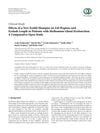 13 citations,
January 2016 in “Journal of Ophthalmology”
13 citations,
January 2016 in “Journal of Ophthalmology” A new eyelid shampoo improved eyelid hygiene and eyelash length in people with Meibomian Gland Dysfunction.
 12 citations,
October 2012 in “Dermatologic Clinics”
12 citations,
October 2012 in “Dermatologic Clinics” Low-Level Laser Therapy and other light treatments for hair growth lack strong evidence and need more research.
 11 citations,
March 2021 in “Dermatology and therapy”
11 citations,
March 2021 in “Dermatology and therapy” Researchers created a new tool to measure the effects of alopecia areata from the patient's view, focusing on hair loss, daily life, and emotional health.
 8 citations,
February 2003 in “Annals of Neurology”
8 citations,
February 2003 in “Annals of Neurology” Progesterone treatment improved seizures in a woman with menstrual cycle-related epilepsy, but a wrong medication worsened her condition.
 7 citations,
July 2018 in “Journal of Functional Biomaterials”
7 citations,
July 2018 in “Journal of Functional Biomaterials” A new anti-baldness patch effectively treats hair loss by blocking enzymes linked to the condition.
 6 citations,
May 2021 in “Clinical Chemistry and Laboratory Medicine”
6 citations,
May 2021 in “Clinical Chemistry and Laboratory Medicine” Different ACE2 gene versions may affect COVID-19 impact based on age and suggest some hair loss drugs could be potential treatments.
 6 citations,
April 2013 in “Journal of Investigative Dermatology”
6 citations,
April 2013 in “Journal of Investigative Dermatology” Spironolactone might lower the chance of getting rosacea.
 4 citations,
January 1998 in “Heterocycles”
4 citations,
January 1998 in “Heterocycles” Researchers made two new compounds that could be used for medicine.
 2 citations,
March 2019 in “European Journal of Dermatology”
2 citations,
March 2019 in “European Journal of Dermatology” Pharmacy-sold shampoos tend to have fewer allergens compared to those sold in other stores.
 2 citations,
February 2003 in “Annals of Neurology”
2 citations,
February 2003 in “Annals of Neurology” Neuroimaging suggests that treatments targeting brain steroids could help control epilepsy, especially types linked to the menstrual cycle.









